All products featured are independently chosen by us. However, SoundGuys may receive a commission on orders placed through its retail links. See our ethics statement.
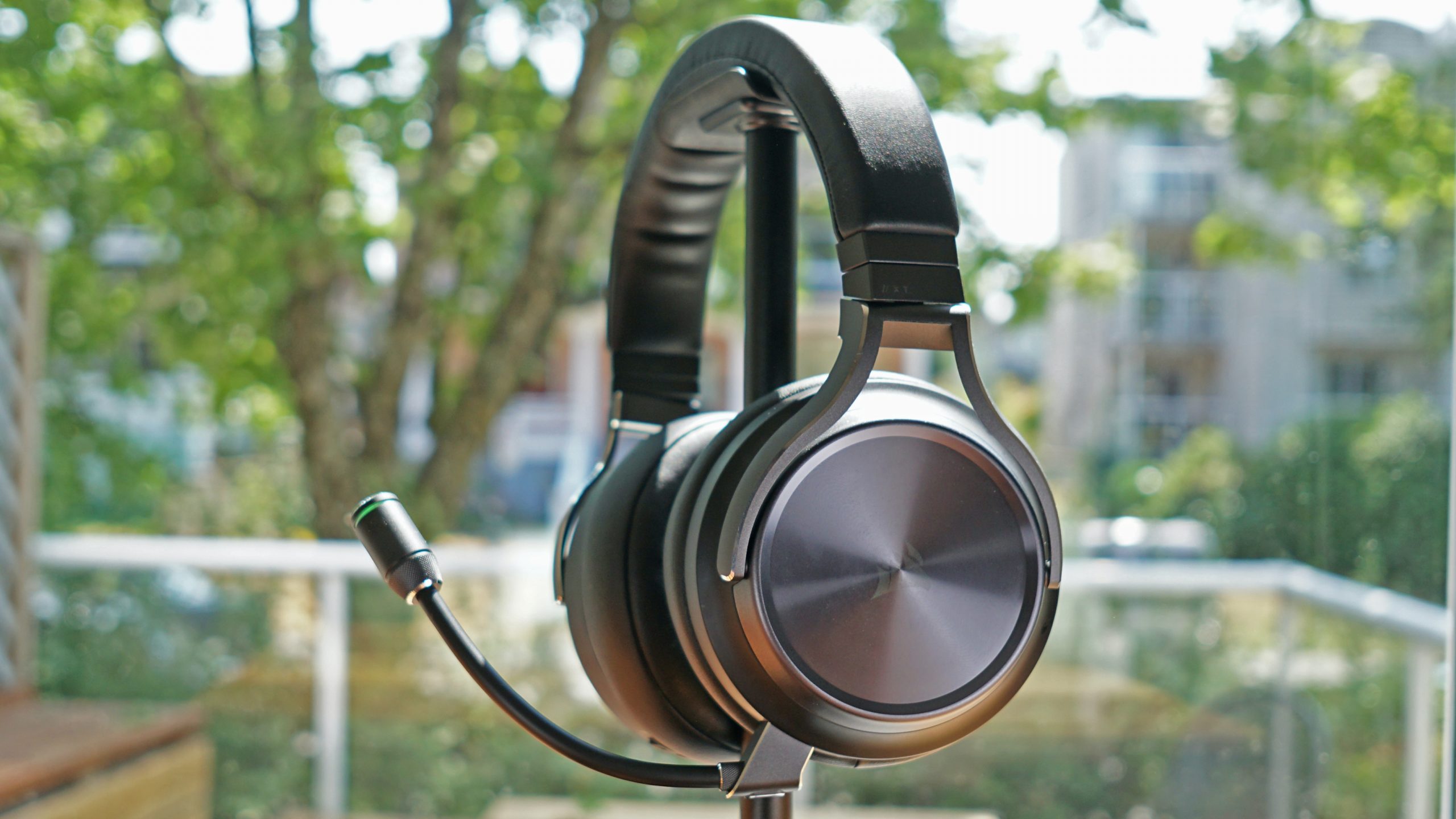
Corsair Virtuoso RGB Wireless XT review
April 11, 2022
Corsair Virtuoso RGB Wireless XT
The Corsair Virtuoso RGB Wireless SE was one of the best gaming headsets to come out in 2019, with a premium build and a fantastic microphone. Now the Corsair Virtuoso RGB Wireless XT is here, sporting all the things that made the previous model great, along with Bluetooth connectivity and some new software perks thanks to an updated version of Corsair iCue.
Does the XT moniker add enough to warrant the jump in price?
Editor’s note: This review was updated on April 11, 2022, to update the frequency response chart to version 2.0 of our house curve, and to add info on the HyperX Cloud Alpha in the Battery section.
- People with big budgets who don’t mind spending a bit extra to get a few more features.
- Gamers looking for something they can pair to a phone using Discord and a console at the same time.
- At-home workers who want a nice microphone without the fuss of extra hardware.
What is the Corsair Virtuoso RGB Wireless XT like?
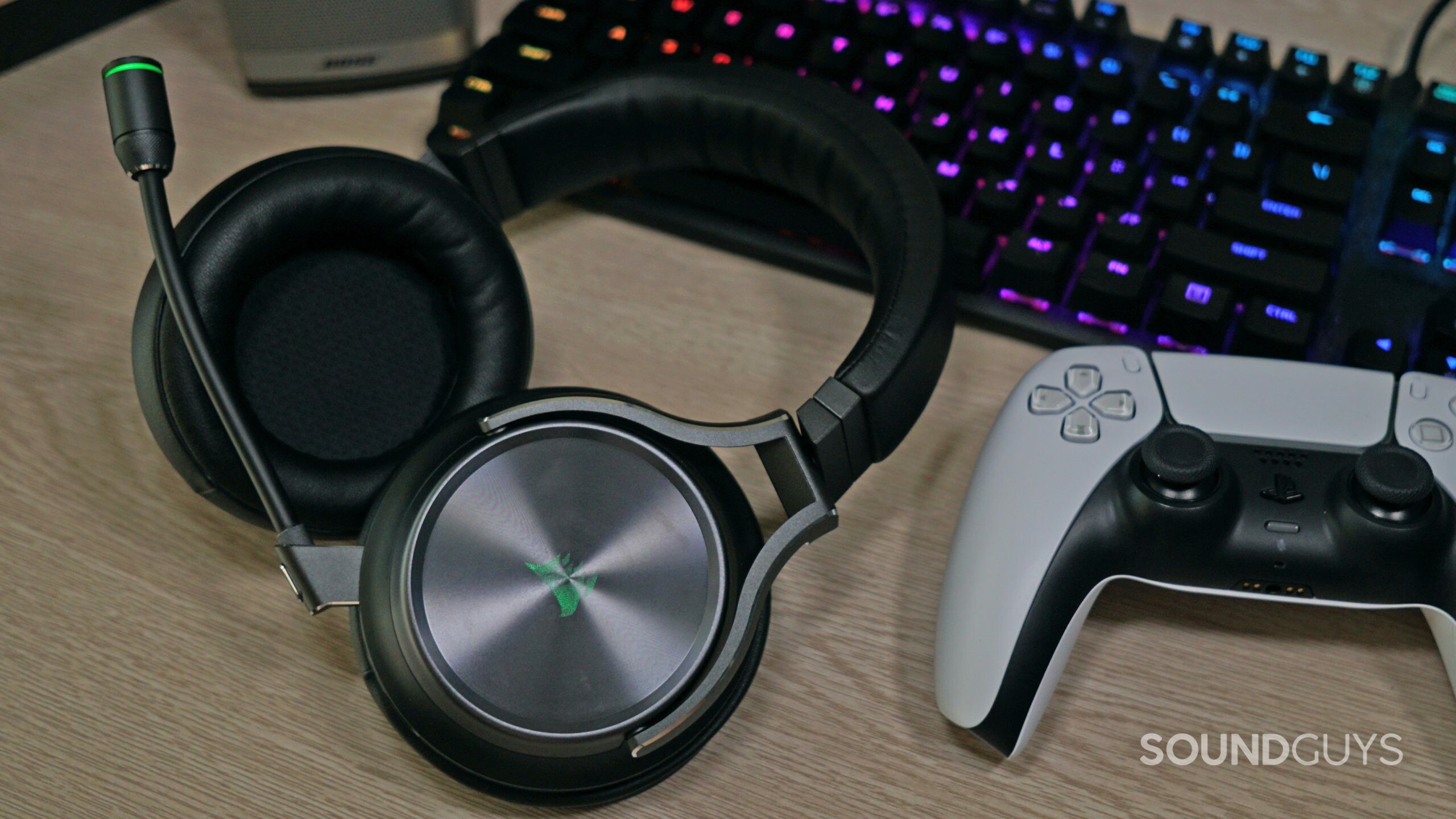
If you’ve seen or used a previous Corsair Virtuoso gaming headset, this new model will be immediately familiar. The Corsair Virtuoso RGB Wireless XT is almost identical to both the SE and regular models of the Virtuoso, though it now sports a slightly darker slate gray aesthetic. However, that’s not a bad thing—like the older models, this is a well-put-together gaming headset.
Start here: How gaming headsets give you the edge
The XT is made almost entirely out of metal, with an aluminum headband and headphones, rocking leatherette-wrapped memory foam cushions. However, while all that metal makes the headset feel very sturdy, it also makes it pretty heavy. The weight adds a degree of security to the fit, given the headband is pretty loose, but if you’re prone to fatigue due to something like this, you’ll probably experience it here. The headphone hinges offer a good range of tilt and can rotate to lay flat in either direction, which makes establishing a seal very easy, though the ear pads themselves are definitely a little shallow. I usually feel my ears bumping up against the drivers, which can get a little uncomfortable over time.
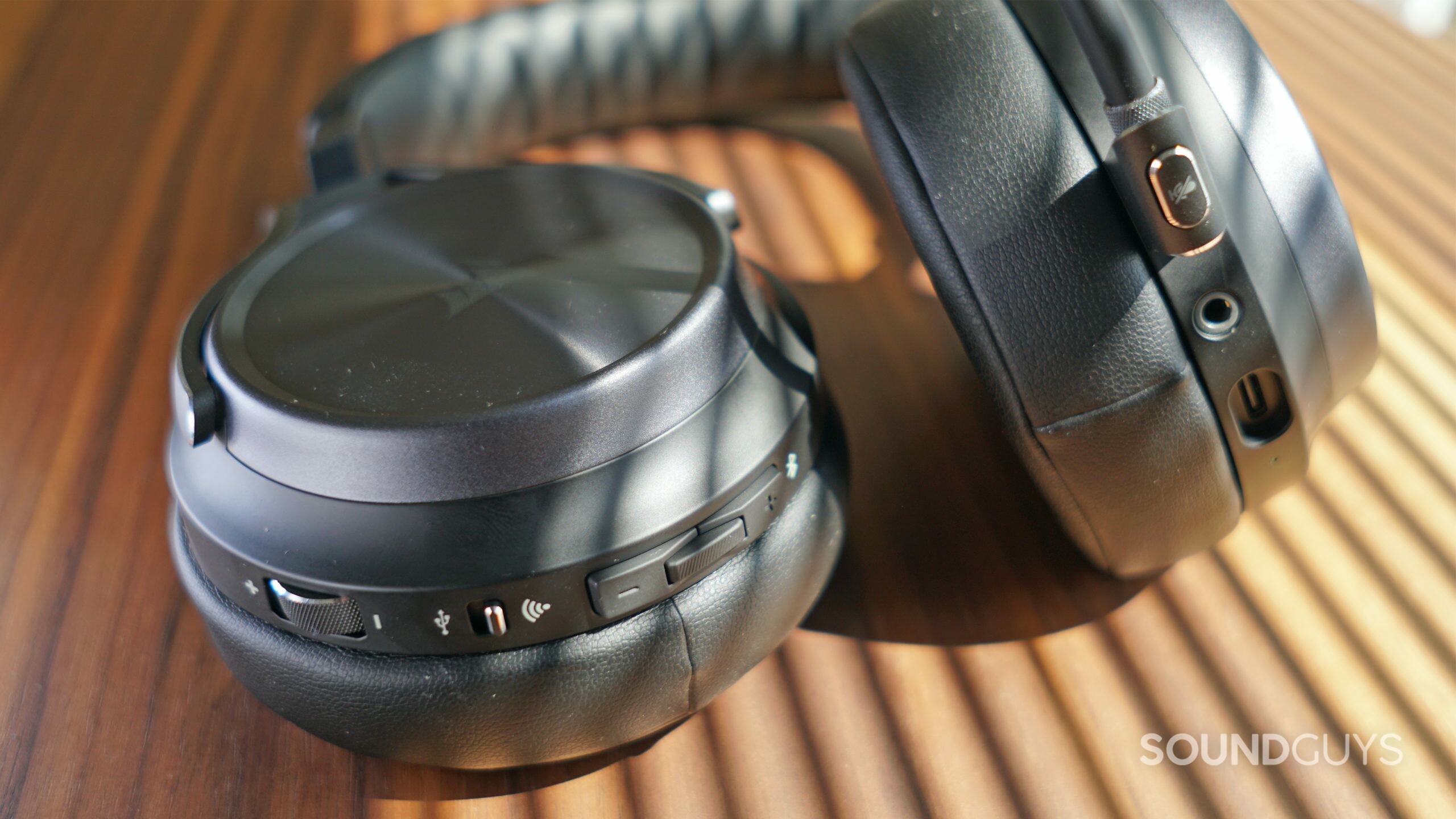
Actually using the Corsair Virtuoso RGB Wireless XT is pretty straightforward. The headset has quite a few on-ear controls, but it’s laid out intelligently enough to not feel daunting. Along the bottom edge of the right headphone, there’s a switch for toggling between wired and wireless audio and a volume dial for gaming audio. There’s also a set of controls for Bluetooth, with buttons for volume control and a standard multifunction button. The mic mute button is actually on the headset’s detachable miniUSB microphone, which sits on the left headphone. Everything feels distinct, so you can easily find what you’re looking for by touch when wearing the headset.
What is it like using Corsair iCue?
Outside of volume control, you need to use the Corsair companion app iCue for more granular customization. Version 4 of the app just launched in spring 2021, with a simpler UI, and it offers quite a few additional features for the Corsair Virtuoso RGB Wireless XT.
Using iCue, you can change the EQ profile of the headset, picking either from presets or creating your own using the built-in 10-band equalizer. There’s a slider for adjusting mic monitoring. You can also set the color and brightness of the LED Corsair logo on the side panels of the headphones (it’s never terribly bright, but at least you’ve got access to the full RGB spectrum color wheel). The device settings menu also lets you adjust things like when the headset’s sleep mode kicks in.
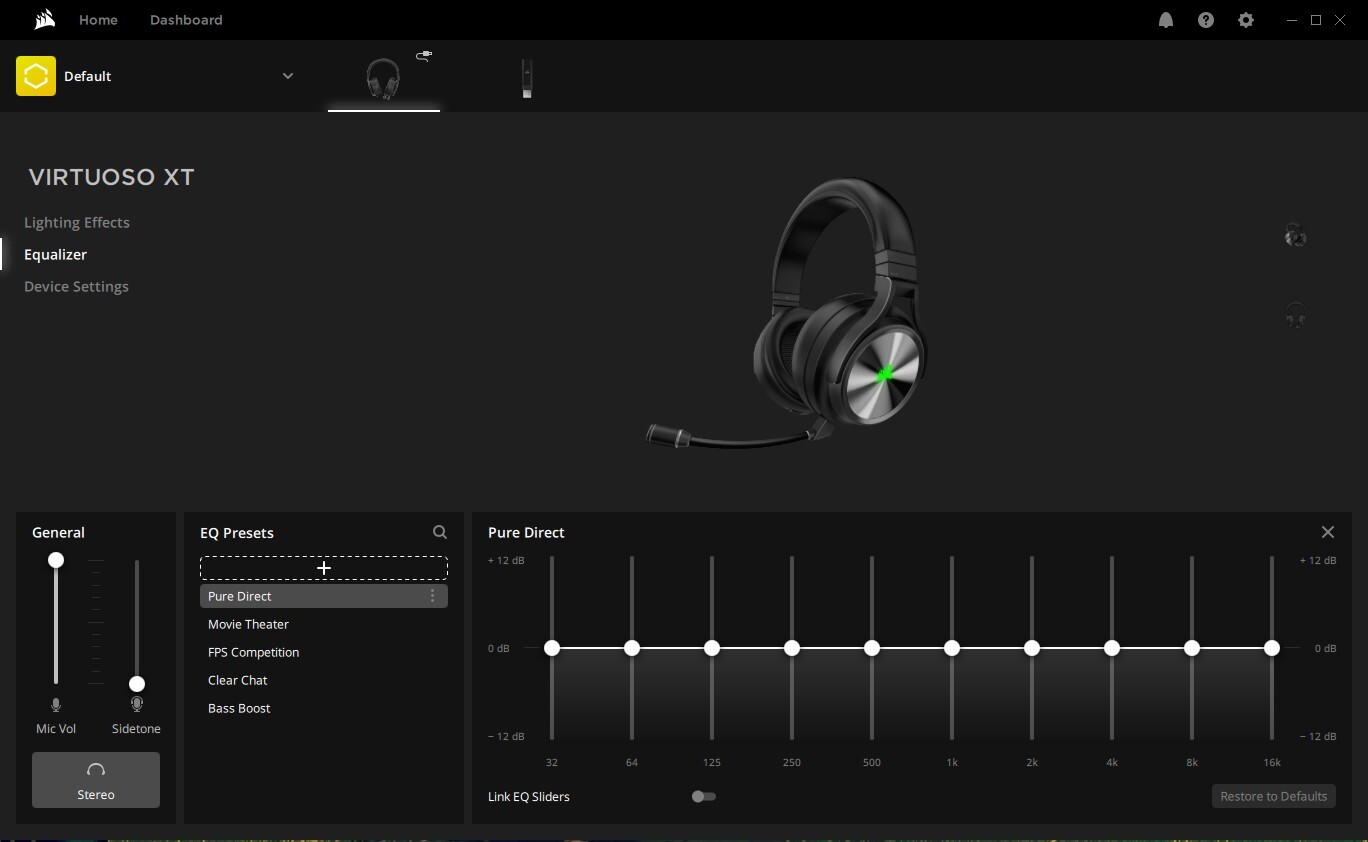
The app will let you update the firmware of both the headset and the USB dongle. Past that, the only other feature for the dongle is a software toggle option for 2.4GHz multipoint, which lets multiple devices using Corsair’s Slipstream 2.4GHz wireless connection use the same USB dongle.
Unlike with the previous Corsair Virtuoso models, this headset no longer supports 7.1 virtual surround sound using Corsair iCue. Just like most gaming headsets released since the new generation of consoles came out, this headset leaves that kind of feature to the platforms you game on. The Corsair Virtuoso RGB Wireless XT is compatible with Dolby Atmos for headphones, so if you have it installed, you can just toggle it on in your Windows sound settings on PC. On console, the headset supports the various built-in standards. This means you don’t need to install iCue unless you really want to tinker with the headset.
Is the Corsair Virtuoso RGB Wireless XT a good gaming headset?
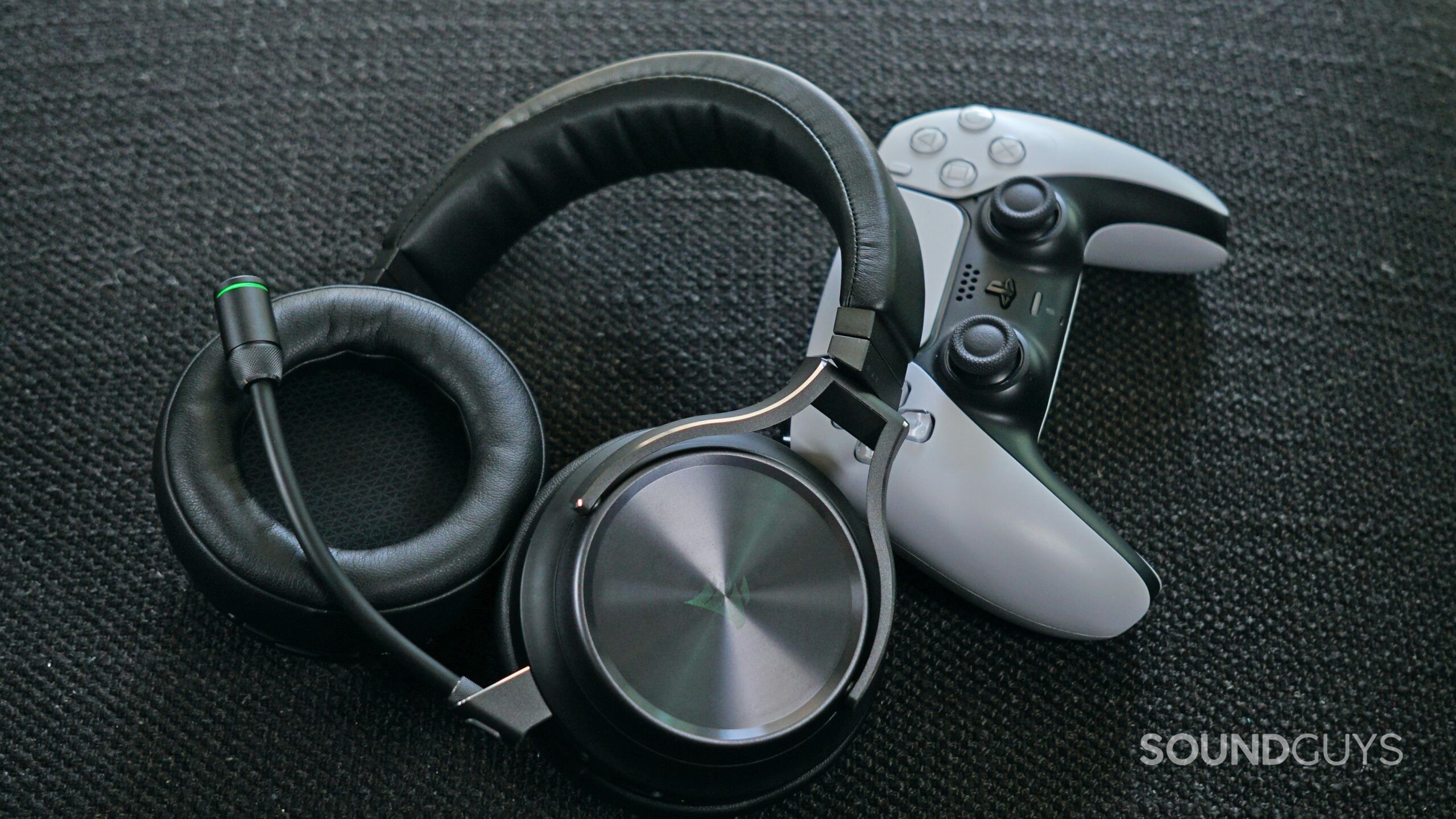
The Corsair Virtuoso RGB Wireless XT offers a pretty solid gaming experience but it might be a little better for shorter sessions, depending on your preferences. If you’re prone to headphone fatigue, or your ears are large enough to press on the headphone drivers (they don’t need to be that big), you may find the headset gets uncomfortable after an hour or two. If those things aren’t issues for you, you could probably play all night comfortably.
The headset fully supports virtual surround sound standards like Dolby Atmos for Headphones, Windows Sonic, and the PlayStation 5’s 3D audio feature. Basically, anywhere you go, you can use your gaming platform’s built-in solution. How well they work depends as much on which game you’re playing, but the Virtuoso RGB Wireless XT handles the demands of Apex Legends using Dolby Atmos for Headphones on PC quite well.
Outside of surround sound needs, the headset doesn’t have any issues with games of most genres. The mix of orchestral scores and myriad sound effects that you’re confronted with while raiding in Final Fantasy XIV comes through clearly and without issue.
How do you connect the Corsair Virtuoso RGB Wireless XT connect?
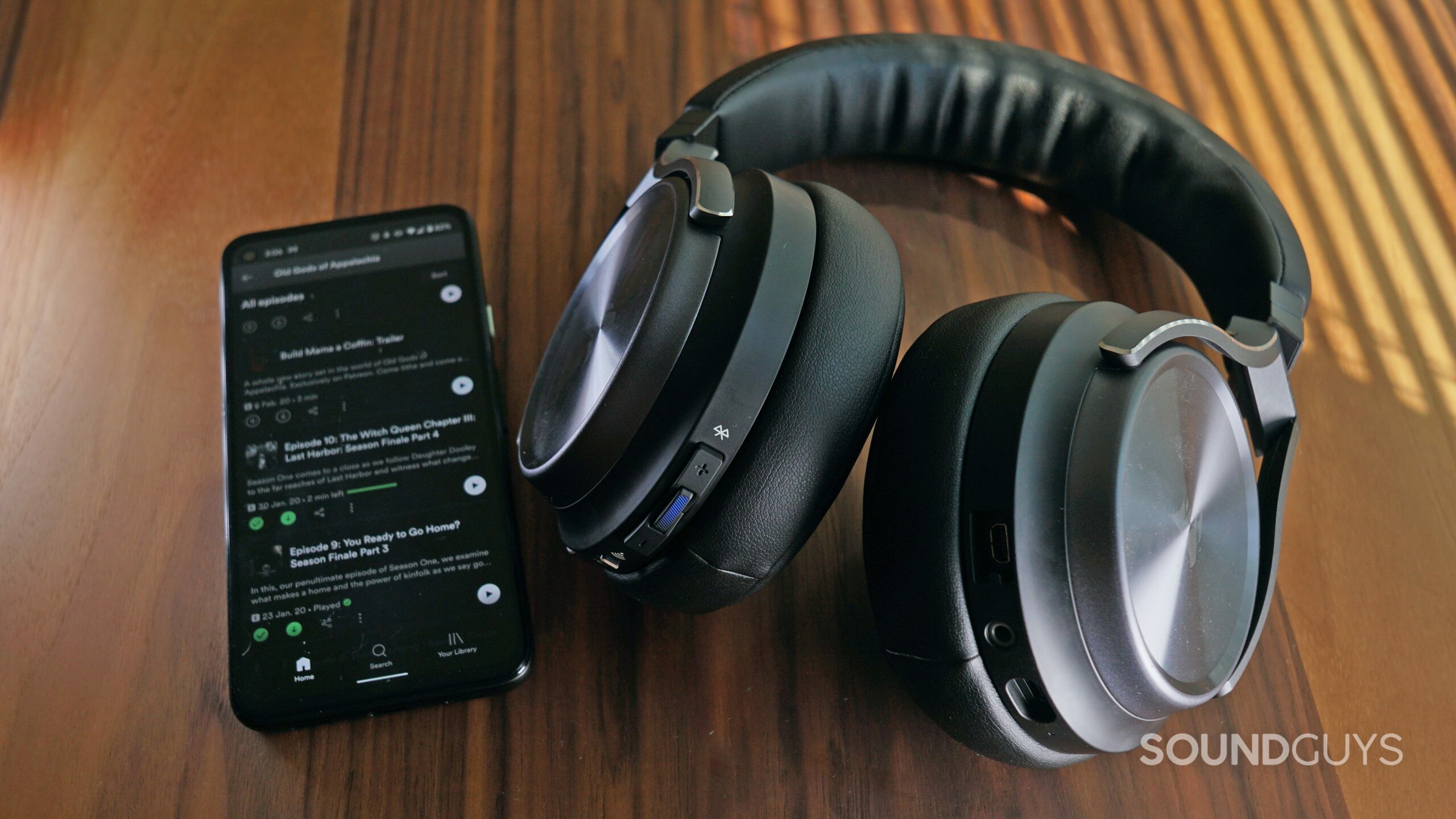
The Corsair Virtuoso RGB Wireless XT features more connection options than just about any other gaming headset. For starters, it has all the typical connection options you’d want from a gaming headset. There’s a USB dongle for lag-free wireless audio to PC, PlayStation 4, and PlayStation 5. Additionally, the headset supports wired audio over USB-C and 3.5mm connections, which opens up compatibility to platforms like the Nintendo Switch and Xbox Series X/S.
Bluetooth connectivity is the only major new feature the XT brings over previous Virtuoso headsets, it sure didn’t skimp. This headset connects using Bluetooth 5.0 and supports the default SBC codec, as well as AAC, aptX, and aptX HD. It’s pretty uncommon for a gaming headset to go past AAC, let alone include aptX HD (if it supports Bluetooth at all in the first place).
Related: How to connect your gaming headset
The Virtuoso RGB Wireless XT doesn’t support Bluetooth multipoint, but simultaneous wireless connections are totally fine. This means you can be connected to your phone via Bluetooth and your gaming platform using the USB dongle at the same time without a problem—great for people talking on Discord and playing on console, or anyone who just doesn’t want to worry about missing a phone call.
How long does the Corsair Virtuoso RGB Wireless XT battery last?
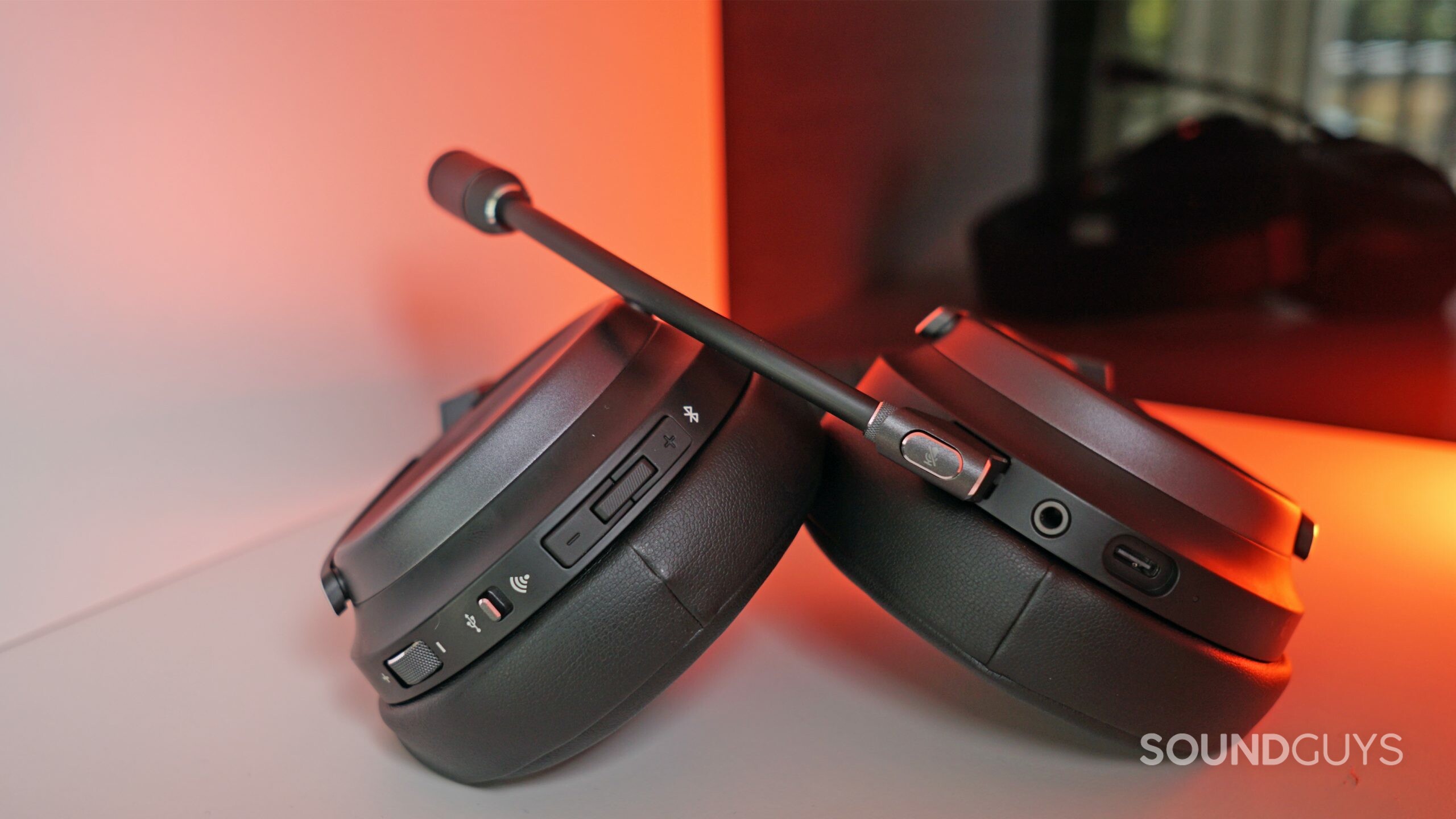
According to Corsair, the Virtuoso RGB Wireless XT can last up to 15 hours on a single charge. In our testing, we found it well exceeds that, lasting 22 hours, 27 minutes at a consistent output of 75dB. Battery performance like this isn’t the absolute best you can find, but it’s definitely on the higher side of what gaming headsets commonly achieve.
Learn more: Where do batteries come from? And where do they go?
If you decide to use simultaneous Bluetooth and 2.4GHz connections, expect considerably worse battery performance overall. There’s no quick charge option here, and charging fully can take hours, but being able to play wired over USB while charging softens the blow a bit.
The HyperX Cloud Alpha Wireless has the best battery life of any gaming headset you can buy, lasting 300 hours according to the company.
(Click the image to expand.)
Does the Corsair Virtuoso RGB Wireless XT block out noise?
Loading chart ...
The Corsair Virtuoso RGB Wireless XT offers pretty average isolation for a gaming headset. A big part of this comes down to the rather shallow ear cups, which won’t provide enough space for people with ears that are a little on the larger side. At home, you shouldn’t have too much trouble, but if you decide to take this out as a pair of Bluetooth headphones, don’t expect it to block out low sounds like the rumble of a traincar.
How does the Corsair Virtuoso RGB Wireless XT sound?
Loading chart ...
The Corsair Virtuoso RGB Wireless XT has a pretty wonky-looking frequency response (cyan) for a gaming headset, especially compared to our target curve (pink). Sub-bass notes below 40Hz are under-emphasized, and there’s a pronounced notch in the midrange from 300Hz-700Hz.
Lows, mids, and highs
The sound profile works okay for most music, but don’t be surprised if some bass sounds aren’t well represented. In Rasputin by Boney M., the strummed guitar and vocals come through clearly throughout, but the bass guitar definitely takes a backseat, and the kick drum loses prominence as the music gets busier.
In game, a frequency response like this shouldn’t really present much of an issue. The variation in the low end means the din of gunfire and explosions may come through a little quieter, but only when there’s something else that’s loud enough to compete with it playing at the same time.
Does the Corsair Virtuoso RGB Wireless XT have a good microphone?
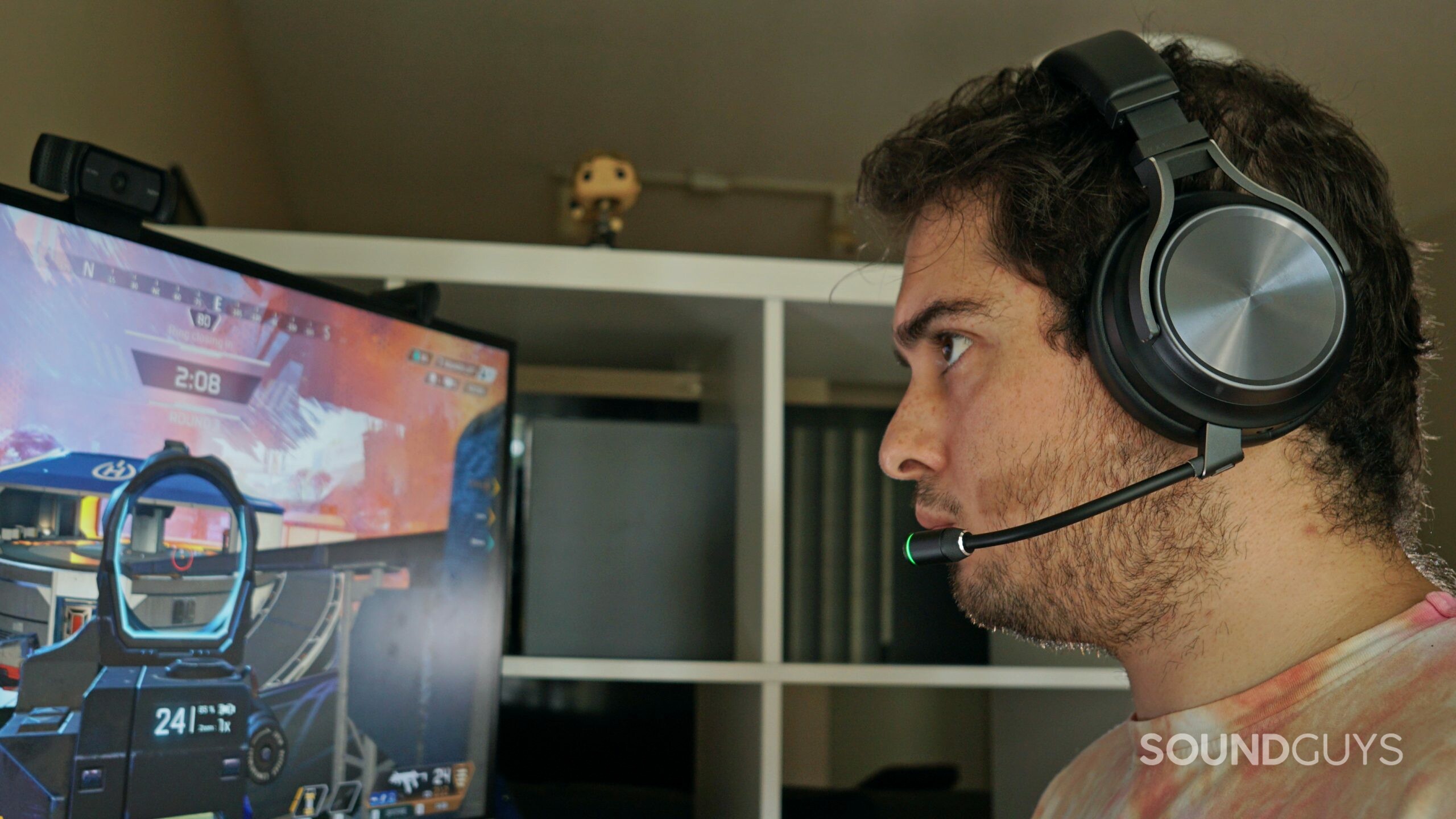
The Corsair Virtuoso RGB Wireless XT sports the same microphone as its predecessors, which Corsair describes as “broadcast grade.” It doesn’t sound as good as most reasonable detached microphones, but this is still just about as good as you could hope to sound coming through a gaming headset. Nobody should have trouble hearing you loud and clear over programs like Discord or through in-game voice chat, and while recording with it won’t sound as good as a dedicated podcast microphone, it’ll certainly do in a pinch.
Corsair Virtuoso RGB Wireless XT microphone demo (Old):
How does the microphone sound to you?
Hold up! Something’s different:
We’ve made a big improvement to how we demonstrate the microphone performance of products we review. We now use a standardized test setup that plays back pre-recorded phrases from a calibrated artificial mouth in our test chamber, either with or without simulated background noises, simulated reverberant spaces, or artificial wind. This means that samples from every product can be directly compared, which makes it far easier to make meaningful comparisons between products in terms of the raw speech quality or the product’s ability to reject noise.
It will take a while to update our backlog of old test results, but we will update this review (and many others!) once we’re able with improved microphone demos. These will be made obvious in each new sample which begins with the phrase, “This is a SoundGuys standardized microphone demonstration …”
Thank you for bearing with us, and we hope to see you again once we’ve sorted everything out.
Should you buy the Corsair Virtuoso RGB Wireless XT?
If money is no object, you should consider buying the Corsair Virtuoso RGB Wireless XT.
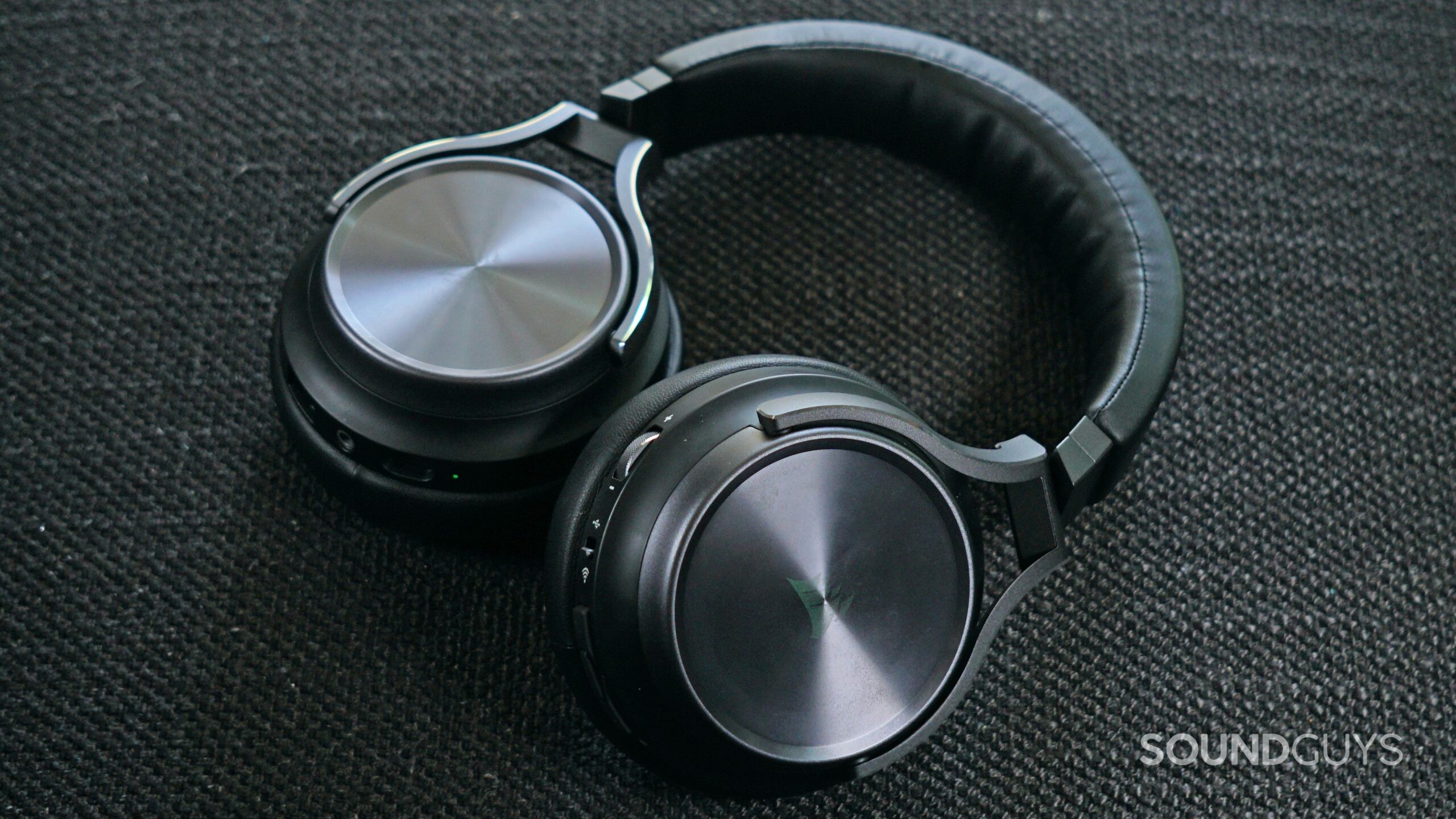
In a vacuum, this is one of the best wireless gaming headsets on the market, if not the best. It has decent audio output, a wide range of compatibility, a fantastic microphone, and Bluetooth codec options for days. It’s well built, comfortable (with an asterisk), and it’s easy to use. However, the Corsair Virtuoso RGB Wireless XT doesn’t exist in a vacuum.
You might like: Corsair gaming headset guide
This is $60 USD more expensive than its nearly identical predecessor (which already goes on sale periodically), and the only thing you get for that much more money is Bluetooth compatibility. Whether that’s a priority comes down to personal preference. Ultimately, this is a gaming headset, and it doesn’t function in that regard any better than its predecessor—Bluetooth is nice, but it’s largely just a luxury here.
If you’ve got cash to burn and you’ve got to have the absolute best, you’re not likely to be disappointed with the Corsair Virtuoso RGB Wireless XT. However, tons of headsets will cover 90% of this headset’s functionality for far cheaper.

What are some alternatives to the Corsair Virtuoso RGB Wireless XT?
If you like everything you’ve seen so far about the Corsair Virtuoso RGB Wireless XT, but you don’t care about Bluetooth, check out the Corsair Virtuoso RGB Wireless SE. It’s basically the same headset, with a slightly lighter gray color and no Bluetooth—as I mentioned above, it’s also significantly cheaper.
The big spenders who want a headset with nicer audio, and don’t mind if the microphone isn’t as hot should look for one of the Audeze gaming headsets. The Audeze Mobius is still one of the most expensive gaming headsets on the market, but its planar magnetic drivers sound fantastic, and its Waves Nx surround sound function works better than any other standard available. If you’re attracted to a wireless headset, the Audeze Penrose sounds just as good as Mobius, works using a wireless USB dongle, and it’s $100 USD cheaper—it lacks Waves Nx, though.
If getting a gaming headset with Bluetooth really gets your motor running, you don’t need to spend this much to find a great option. SteelSeries Arctis 9 Wireless is considerably cheaper than the Virtuoso, and it arguably more comfortable—the main trade-offs are a lack high quality Bluetooth codecs and a less nice (but still totally fine) microphone. Even cheaper are options like the EPOS H3 Hybrid, which offers wired audio in addition to Bluetooth connectivity, and the Razer Kaira Pro, which uses Xbox Wireless and Bluetooth connection methods. Both of those are definitely more niche options, though.
Frequently asked questions about the Corsair Virtuoso RGB Wireless XT
If you’re happy to go cheaper, wireless gaming headsets like the Razer Barracuda X or SteelSeries Arctis 1 Wireless work everywhere either wirelessly or over 3.5mm. Their USB-C dongles both guarantee wireless audio with the Nintendo Switch (docked or undocked), in addition to PlayStations and PC. Both of them sound great, and beat the Virtuoso RGB Wireless XT’s battery life in spades—they’re also only $99 USD.
Thank you for being part of our community. Read our Comment Policy before posting.